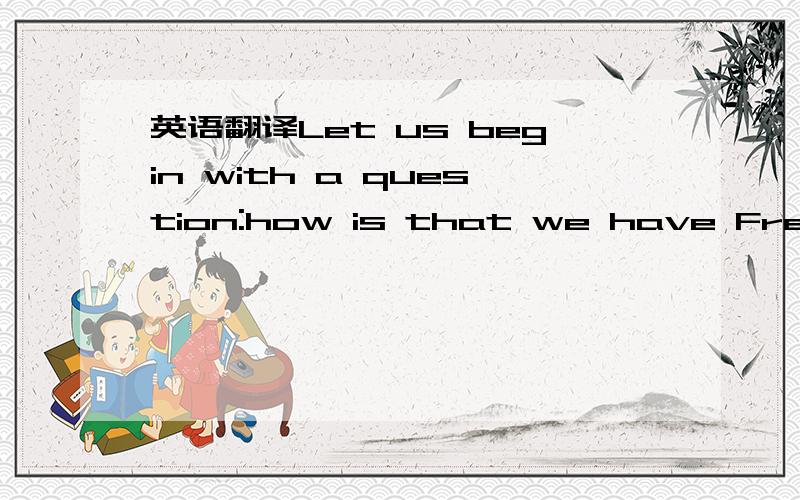英语翻译Let us begin with a question:how is that we have Freudia
来源:学生作业帮 编辑:神马作文网作业帮 分类:英语作业 时间:2024/11/14 10:47:45
英语翻译
Let us begin with a question:how is that we have Freudian interpretations of tragedy and myth,of fairy tale and comedy—yet nothing comparable for the novel?For the same reason,I believe,that we have no solid Freudian analysis of youth:because the raison d’etre of psychoanalysis lies in breaking up the psyche into its opposing “forces”—whereas youth and the novel have the opposite task of fusing,因为or at least bringing together,the conflicting features of individual personality.Because,in other words,psychoanalysis always looks beyond the Ego—whereas the Bildungsroman attempts to build the Ego,and make it the indisputable center of its own structure.…
If the Bildungsroman’s initial option is always explicitly anti-heroic and prosaic—the hero is Wilhelm Meister,not Faust; Julien Sorel and Dorothea Brooke,not Napoleon or Saint Theresa (and so on to Flaubert,and then to Joyce)—these characters are still,though certainly all “normal” in their own ways,far from unmarked or meaningless in themselves.…
Just think of the historical course of the Bildungsroman:it originates with Goethe and Jane Austen who,as we shall see,write as if to show that the double revolution of the eighteenth century could have been avoided.It continues with Stendhal’s heroes,who are born “too late’ to take part in the revolutionary-Napoleonic epic.It withers away with 1848 in Flaubert’s Sentimental Education (the revolution that was not a revolution) and with the English thirties in Eliot’s Felix Holt and Middlemarch (the “Reforms” that did not keep their promises).It is a constant elusion of historical turning points and breaks:an elusion of tragedy and hence,as Lukacs wrote in Soul and Forms,of the very idea that societies and individuals acquire their full meaning in a “moment of truth.”
An illusion,we may conclude,of whatever may endanger to Ego’s equilibrium,making its compromises impossible—and a gravitation,in contrast,to those modes of existence that allow the Ego to manifest itself fully.In this sense—and all the more so if we continue to believe that moments and occasions of truth,despite everything,do still exist—the novel must strike us as a weak form.This is indeed the case,and this weakness—which,of course,is ours as well—goes together with the other features we have noted:its contradictory,hybrid and compromising nature.But the point is that such features are also intrinsic to that way of existence—everyday,normal,half-unaware and decidedly unheroic—that Western culture has tried incessantly to protect and expand,and has endowed with an ever-growing significance:till it has entrusted to it what we keep calling,for lack of anything better,the “meaning of life.” And as few things have helped shape this value as much as our novelistic tradition,then the novel’s weakness should strike us perhaps as being far from innocent.…
Let us begin with a question:how is that we have Freudian interpretations of tragedy and myth,of fairy tale and comedy—yet nothing comparable for the novel?For the same reason,I believe,that we have no solid Freudian analysis of youth:because the raison d’etre of psychoanalysis lies in breaking up the psyche into its opposing “forces”—whereas youth and the novel have the opposite task of fusing,因为or at least bringing together,the conflicting features of individual personality.Because,in other words,psychoanalysis always looks beyond the Ego—whereas the Bildungsroman attempts to build the Ego,and make it the indisputable center of its own structure.…
If the Bildungsroman’s initial option is always explicitly anti-heroic and prosaic—the hero is Wilhelm Meister,not Faust; Julien Sorel and Dorothea Brooke,not Napoleon or Saint Theresa (and so on to Flaubert,and then to Joyce)—these characters are still,though certainly all “normal” in their own ways,far from unmarked or meaningless in themselves.…
Just think of the historical course of the Bildungsroman:it originates with Goethe and Jane Austen who,as we shall see,write as if to show that the double revolution of the eighteenth century could have been avoided.It continues with Stendhal’s heroes,who are born “too late’ to take part in the revolutionary-Napoleonic epic.It withers away with 1848 in Flaubert’s Sentimental Education (the revolution that was not a revolution) and with the English thirties in Eliot’s Felix Holt and Middlemarch (the “Reforms” that did not keep their promises).It is a constant elusion of historical turning points and breaks:an elusion of tragedy and hence,as Lukacs wrote in Soul and Forms,of the very idea that societies and individuals acquire their full meaning in a “moment of truth.”
An illusion,we may conclude,of whatever may endanger to Ego’s equilibrium,making its compromises impossible—and a gravitation,in contrast,to those modes of existence that allow the Ego to manifest itself fully.In this sense—and all the more so if we continue to believe that moments and occasions of truth,despite everything,do still exist—the novel must strike us as a weak form.This is indeed the case,and this weakness—which,of course,is ours as well—goes together with the other features we have noted:its contradictory,hybrid and compromising nature.But the point is that such features are also intrinsic to that way of existence—everyday,normal,half-unaware and decidedly unheroic—that Western culture has tried incessantly to protect and expand,and has endowed with an ever-growing significance:till it has entrusted to it what we keep calling,for lack of anything better,the “meaning of life.” And as few things have helped shape this value as much as our novelistic tradition,then the novel’s weakness should strike us perhaps as being far from innocent.…

开始我们有这样一个问题:我们解释弗洛伊德悲剧和神话,童话和悲剧是无与伦比的小说吗?出于同样的原因,我相信,我们没有坚实的弗洛伊德的分析青年:因为存在的理由在于打破了精神分析心理为反对“力量”而青春小说有相反的任务因为融合,或至少汇集,冲突的特点,个人人格.因为,换句话说,心理分析总是超越ego-whereas成长小说试图建立自我,并使它无可争议的中心自身的结构.…如果教育小说的初步选择是明确的反英雄和平凡的—英雄是威廉•梅斯特,不是浮士德;朱利安索雷尔和多萝西布鲁克,不拿破伦或圣特丽萨(等福楼拜,再到乔伊斯)-这些人物仍然是,尽管所有的“正常”在他们自己的方式,远未本身毫无意义.…想想历史课程的教育小说:它起源与歌德和简奥斯丁,我们将看到,写得似乎表明,双重革命第十八世纪是可以避免的.它继续与斯汤达的英雄,谁是天生的“太晚了”参与revolutionary-napoleonic史诗.它消亡1848在福楼拜的情感教育(革命不是一个革命)和英语30爱略特费利克斯·霍尔特和米德尔(“改革”,不遵守诺言).这是一个不断规避的历史转折点和休息:一个规避悲剧,因此,作为卢卡奇写在灵魂和形式,的想法,社会和个人获得充分的意义在“真相时刻.”幻觉,我们可以得出结论,任何可能危及到自我的平衡,使其妥协impossible-and万有引力,相比之下,那些存在的模式,允许自我体现充分.在这-更是如此,如果我们继续相信真理的时刻和场合,尽管这一切,仍然存在,我们必须打击的小说作为一个弱形式.这是真实的情况,这weakness-which,当然,是我们的well-goes连同其他功能我们注意:其矛盾,混合和损害的性质.但是,这样的特点也固有的方式existence-everyday,正常,half-unaware,unheroic-that西方文化不断试图保护和扩大,并赋予了与不断增长的意义:它赋予它保持我们称,没有什么好,“生命的意义.”和一些事情帮助塑造这一价值尽我们的小说传统,那么小说的弱点或许是让我们为远远从无辜.…
英语翻译Let us begin with a question:how is that we have Freudia
英语翻译求when it is time to die,let us not discover that we have
Let() begin() class.A.us,us B.us,our C.we,our
英语翻译I have asked a question:Lang Ping is US valleyball coach
but how many of us can honestly say that we have not felt a
what is that over there?let us go and ( )it 选项:1 have a look
how about going camping with.us this weekend? A.Is that righ
英语翻译1.to show how much we're going to miss her,let's have a
( ) everyone is here ,let us begin our class.A .Since B .For
let's have a rest,shall we?和 let us have a rest,will you?
英语翻译Let us have ( ) and ( ) ( )
let us play volleyball.that is a good